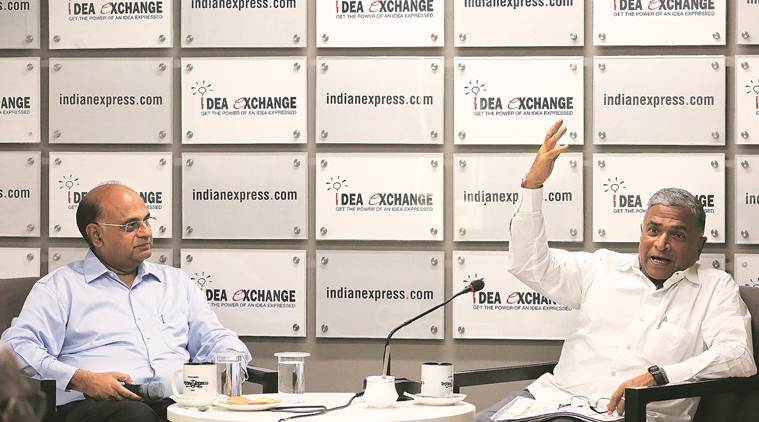 Harivansh Narayan Singh with Assistant Editor Pradeep Kaushal in The Indian Express newsroom. (Express photo/Renuka Puri)
Harivansh Narayan Singh with Assistant Editor Pradeep Kaushal in The Indian Express newsroom. (Express photo/Renuka Puri)
PRADEEP KAUSHAL: You have been a journalist for several years. How has the transition to politics been?
I was always politically conscious and that is why I became a journalist. As a student at Banaras Hindu University, I was very active politically. I came from a family where having a job was very important and so I took up a job as a lecturer. Eventually, I switched to journalism. I thought it was a medium to say things.
After that, I got a chance to work at Dharmyug. But I was not sure if I wanted to stay in Mumbai and so I moved to Hyderabad and got a job at a bank. Later, I went to Patna and joined the Raviwar magazine and finally got associated with Prabhat Khabar. It gave me the opportunity to work in the undivided Bihar.
At both Raviwar and Prabhat Khabar, I was interested in political issues and how the Parliament works. I wrote about the political stalemate in Parliament then and on the money deposited by Indians in Swiss banks. One of my articles questioned the lack of discussion on pertinent issues in Parliament despite the presence of educated people. Through our stories in Prabhat Khabar we emphasised that till the time the Vidhan Sabha functions properly things won’t improve. Only politics can redeem politics.
In 2014, (Bihar CM) Nitish Kumar asked me to join politics. By then I had been in journalism for 27-28 years. I wanted to see how the institutions we write about work.
ABANTIKA GHOSH: Journalists questioning the government are being branded anti-national. How does one do journalism in this climate?
With the advancement in technology, no one’s voice can be muffled or stopped anymore. Journalists have to continue doing their job.
RAVISH TIWARI: But even objective reports by journalists are sometimes referred to as biased. As someone who has also been on the other side, how do you rationalise such criticism?
It’s a very relevant question and I have been in such situations too. I believe that when you are working, you should do it with passion. I remember when Justice Markandey Katju was the chairman of the Press Council, he wrote to newspapers in Bihar accusing them of not presenting the Opposition’s view. I think ours was the only newspaper that wrote back to him saying that we had been doing stories against the government as well.
It is the responsibility of a journalist to stand by the good and against the bad. That is my personal opinion. Whatever we do, we must do it with passion.
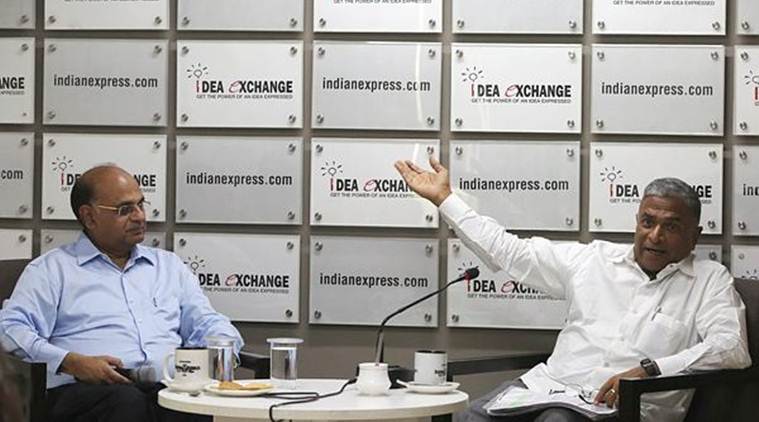 “In 2014, (Bihar CM) Nitish Kumar asked me to join politics. By then I had been in journalism for 27-28 years. I wanted to see how the institutions we write about work,” Singh said. (Express photo/Renuka Puri)
“In 2014, (Bihar CM) Nitish Kumar asked me to join politics. By then I had been in journalism for 27-28 years. I wanted to see how the institutions we write about work,” Singh said. (Express photo/Renuka Puri)
RAVISH TIWARI: Now that you are a part of the system, what do you think plagues it and what empowers it?
In 2016, I wrote an article in Firstpost on Parliament disruptions. I felt that the institutions responsible for solving the country’s big issues were not performing their role… Today, there is a political deadlock, a distance (in Parliament). Dialogue is important to ensure that institutions in a Parliamentary democracy work properly. Ideologies can differ. This country is made up of different cultures, languages and practices. That will remain. Our strength is in our diversity. We have to find a way within this reality. Over the past 25-30 years, there have been fewer attempts to find a way.
I feel that a new society is emerging across the world, whether you want it or not. Earlier, the world was governed by thought. Thought is what moulded history. Today, Steve Jobs’s iPad is impacting every house. A new world is emerging. What impact it has on India is something that our politics should debate. We should see where things are going and what we should do about them.
All parties should sit together. There is no other way in a democracy than to get all parties to come together and have a dialogue and build a consensus.
RAJ KAMAL JHA: You said there is a distance between parties now. Why do you think that is happening?
This started in the 1970s after the division of the Congress. After 1984 and 1989, these distances increased. If a party in power made a mistake, boycott of Parliament was seen. Slowly, the situation got worse.
Today, there are so many important issues to be tackled in the country, such as population. All demographic reports say that we are going to become the most populous country in the world in 8-10 years. We have to plan to address this. In the coming 20-25 years, when India becomes the most populous country, where will the food grains come from, what will happen to employment, how will we tackle migration from villages… Look at the condition of our cities. Do we have enough infrastructure? What will happen to housing, what about schools?
The world is moving towards a knowledge society. What is the future of our children? In universities, the PhDs are in poor shape. There are several other problems in our universities as well and this decline started in 1960s. We need a consensus in Parliament on such issues. Leaders from most parties agree on this. We now need to find a way to bring them all together and have this discussion.
PRADEEP KAUSHAL: Is this why the judiciary is interfering in the Parliament’s domain?
Yes, that is one reason. On several critical issues, Parliamentarians have failed to reach a consensus. The rights given to us by the Constitution, to govern and make rules, are not being utilised. People think about the political repercussions, votes and whether the decision will go in their favour or not. When you abdicate your basic responsibilities then someone else will have to take it up. It is important for the judiciary to be powerful but the Parliament must also do its job.
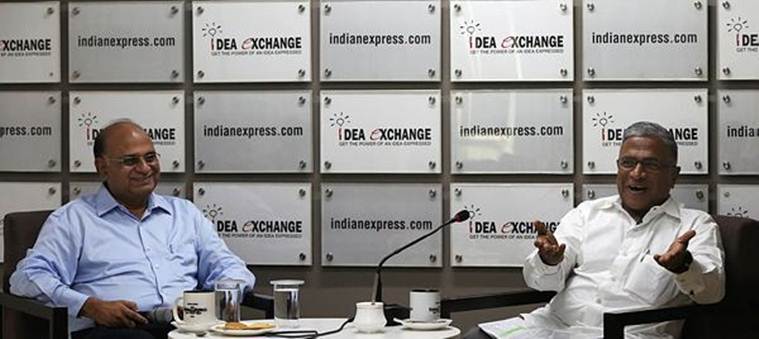 “It is the responsibility of a journalist to stand by the good and against the bad. That is my personal opinion. Whatever we do, we must do it with passion,” Singh said. (Express photo/Renuka Puri)
“It is the responsibility of a journalist to stand by the good and against the bad. That is my personal opinion. Whatever we do, we must do it with passion,” Singh said. (Express photo/Renuka Puri)
LALMANI VERMA: The Rajya Sabha deputy chairperson’s election was seen as a test of the Opposition’s unity. It became an NDA versus UPA fight.
In 2004, when Atal Bihari Vajpayee lost elections, he said that the Indian democracy had won and my party lost. The situation before the election was different as compared to now. I have the responsibility of the House and I stand for everyone. I believe all political parties are concerned about the people of this country. We will try and create an environment where a discussion on the country’s issues is possible. There is no other way to find solutions.
ABANTIKA GHOSH: During disruptions in Parliament, the Opposition often accuses the ruling party of not reaching out to them. How would you change that?
Creating channels for discussions, staying in touch with people, being fair to all parties — all the democratic ways will have to be used. Since 1998-99 things have worsened but they have to end somewhere. Allegations and counter allegations by parties will have to stop and a solution to the nation’s problems will have to be found together.
ABANTIKA GHOSH: When you were elected and the MPs were giving speeches, the Prime Minister made some comments that had to be expunged. Do you think such comments are the reason why political parties are drifting apart?
There are norms in Parliament — how it should work, what should be said etc. Everyone should abide by them.
SANDEEP SINGH: You said that MPs are concerned about people but you also mentioned that serious issues are not being discussed in Parliament. Do they have a vision for the country?
When I became an MP, I went to speak at a college in Arrah. Students there asked me about the Westminster model and parliaments in other Commonwealth countries, and why they did not witness disruptions. I did not have an answer. One student spoke about a Jain text on social dialogue and how things should be conducted. In King Janak’s durbar there was a man called Ashtavakra who was challenged by people and who challenged others. Debates took place. Look at Shankaracharya. He set off from Kerala and participated in debates across the country. There is a Westminster model and there are our old models. We don’t stick to either.
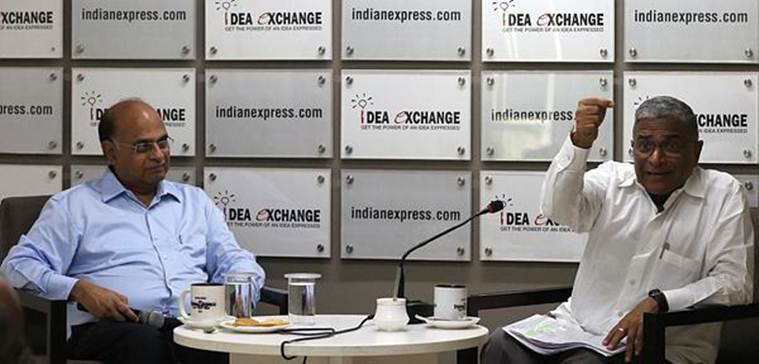 “Creating channels for discussions, staying in touch with people, being fair to all parties — all the democratic ways will have to be used,” the Rajya Sabha deputy chairperson said. (Express photo/Renuka Puri)
“Creating channels for discussions, staying in touch with people, being fair to all parties — all the democratic ways will have to be used,” the Rajya Sabha deputy chairperson said. (Express photo/Renuka Puri)
Another student spoke about the Mahabharata and how the common people follow the path taken by leaders. In the Gita, Krishna said that the behaviour of those sitting above should be such that the people below them follow it. These models existed in our country but not anymore. We need to pay attention to it.
In a democracy, people’s views range from the extreme Left to the extreme Right. It is our job to ensure that all thoughts reach the people. The people are intelligent enough to decide what is in their interest. I have seen people from both the extreme Left and the extreme Right follow Mahatma Gandhi in their way of life. Today we have forgotten the relevance of Gandhi. Without Gandhi, it is tough to save the society from the situation it is in now.
PRADEEP KAUSHAL: Are you in favour of reservation for women in Parliament?
The situation is unsatisfactory right now. I believe that right from the Parliament to everywhere else, there should be a minimum of 50 per cent reservation for women. If you look at the world’s development history, you will see that developed countries have recognised the power of their women. We must do it. The states that have 50 per cent reservation for women in panchayats, there the women are doing a very good job.
I was recently reading a comment by the IMF managing director on the 2008 Lehman Brothers crisis. She said that there wouldn’t have been a crisis if the firm were called Lehman Sisters. I stand for that.
RAVISH TIWARI: Who informed you that you would be a candidate for the post of the deputy chairperson? Was it Nitish Kumar, Amit Shah or the Prime Minister?
I was told a day before by everyone.
RAVISH TIWARI: Do you think the 2014 general elections reflected a change in the Indian society or was it only a result of anti-incumbency?
In 1977, I was a student and I had just got a job. I remember that night (when the results for the general elections were declared. It was the first time that the Congress lost power in independent India)… I was near the mantralay where a board was put up with the names and figures for parties. The who’s who of Bombay was there. I realised that while I did not have a chance to witness the freedom struggle, I saw this. Back then too people wanted change. In fact, since 1977, people have been looking for a better society. In 2014, I saw the same thing happen.
RAVISH TIWARI: You worked very closely with the former prime minister Chandra Shekhar. He got a very brief chance to lead the country. How do you think history will judge him?
Chandra Shekhar might have had some flaws but he did not get the respect that he deserved as a person and a politician. He was a very decisive person who would have been good for the country. He understood the grassroots because that is where he came from.
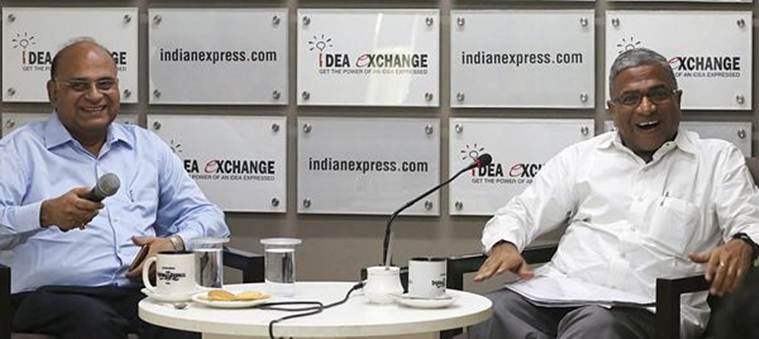 “Chandra Shekhar might have had some flaws but he did not get the respect that he deserved as a person and a politician,” Singh said. (Express photo/Renuka Puri)
“Chandra Shekhar might have had some flaws but he did not get the respect that he deserved as a person and a politician,” Singh said. (Express photo/Renuka Puri)
He came into Rajya Sabha in 1962 as a member of the Praja Socialist Party. Later, he was removed and he remained an Independent MP for a while. When he met Indira Gandhi for the first time — she was not the prime minister then — she asked him why did he want to join the Congress. He said, ‘Indiraji, I have worked to make the Praja Socialist Party strong for the past 10-15 years and we did it in UP. PSP became the first recognised opposition party in UP but I couldn’t change the party. I will come into the Congress and either make it socialist or I will break it.’ This was their first encounter. She was shocked and asked him why did he want to break the Congress. He told her that if a socialist society has to be created, the Congress will have to accept new policies.
I can quote from a dozen documents on debates in the Congress and its committees that show how he took forward these issues and ideologies forward. When the Congress split up in 1969, it happened over these issues. He was a leader who did not get a chance to govern properly. He understood the country and had the courage to take bold decisions.
VANDITA MISHRA: Do you think the Nitish Kumar government has reached a plateau in terms of ideas and resources? While changes were happening quickly earlier, there is now a standstill.
If I talk about the work that is happening or has happened it will seem as though I am saying it only because I have been associated with the party. But the Bihar government is still working the way it was earlier. Nitish Kumar has made many effective laws to empower people which have not been made in other parts of the country.
RAVISH TIWARI: People have raised questions about the Rajya Sabha and said that the people’s mandate is reflected in the Lower House and at times the Upper House has gone against it. How do you see the role of the Rajya Sabha vis-a-vis the popular mandate?
I would answer that with a quote. In the first meeting of the Rajya Sabha Dr Sarvepalli Radhakrishnan said, “There is a general impression that this House cannot make or unmake governments and, therefore, it is a superfluous body. But there are functions which a revising chamber can fulfill fruitfully. We are for the first time starting, under the new Parliamentary system, with a second chamber, and we should try to do everything in our power to justify to the public of this country that a second chamber is essential to prevent hasty legislation. We should discuss with dispassion and detachment proposals put before us.”
VANDITA MISHRA: In terms of giving space to the Opposition, how do you see the function of the Rajya Sabha, given that the ruling party has a majority in the Lok Sabha?
In both the Houses, all sides should be given a chance to speak and put their point across. A general consensus has to be created for this. We can continue to say that it is this person’s fault or that person’s fault, but that will not be fair to the future generations and the country.